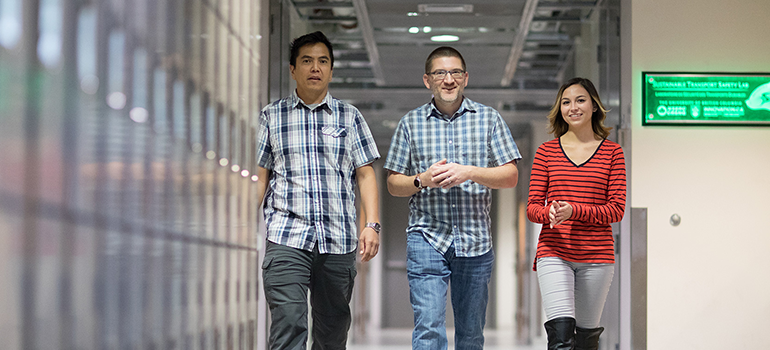
New funding will bring Indigenous-focused modules into the Engineering curriculum.
The initiative is funded by UBC Okanagan’s Aspire Learning and Teaching (ALT) Fund. The Fund supports curriculum change, innovative teaching practices and learning environment enhancements as envisioned by the campus’ strategic plan.
Over the next three years, the initiative will see Indigenous-focused modules added to the Engineering curriculum to enhance the existing Applied Science program.
The School of Engineering’s Ian Foulds and Jannik Eikenaar are leading the initiative.
“Research indicates there are numerous benefits from incorporating case studies into the classroom and it is especially helpful in bridging theory and practice” explains Foulds.
Building the modules is only one of the focuses of the initiative, according to Eikenaar. “Just as importantly, this initiative will include training for our faculty members to help them build this content into their existing courses.”
Faculty will be provided with training that includes best practices for using the modules, and cultural sensitivity training.
“One of the goals of the School of Engineering is to increase community outreach initiatives that promote engineering for under-represented populations” explains Foulds. “By building awareness and understanding among our students, staff, and faculty members, we hope to better support our Indigenous students and engage with Indigenous communities.”
The initiative is also a response to The Truth and Reconciliation Commission’s call for educators to “build student capacity for intercultural understanding, empathy and mutual respect” (Calls to Action, clause 63).
The modules will include case studies that highlight historical contexts and legal requirements for consultation with Indigenous communities. They will also provide tools to develop strong working relationships with Indigenous peoples through cultural understanding.
Once the modules are fully incorporated into the curriculum, Foulds and Eikenaar hope it leads to a more equitable and inclusive learning environment.
“As awareness of Indigenous contexts increases in our undergraduate population, and best practices for consultation and engagement are developed, we expect to see proposals for course‐based projects that involve collaboration with Indigenous communities” explains Foulds.
Approximately 2000 Engineering students will directly benefit from this initiative over the next three years.
For more information about the Aspire Learning and Teaching Fund at the Okanagan campus of the University of British Columbia visit https://altfund.ok.ubc.ca/